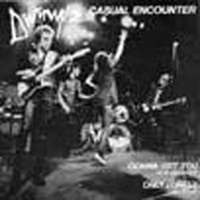Casual Encounter
"Casual Encounter" is a song by Australian rock band Divinyls, released in August 1983. The song originally appeared on the Australian release of the band's debut album Desperate, but first appeared on the international release of their second album What a Life!. "Casual Encounter" did not meet with success when it was released as a single, only peaking at number ninety-one on the Australian Kent Music Report singles chart.
| "Casual Encounter" | ||||
|---|---|---|---|---|
 | ||||
| Single by Divinyls | ||||
| from the album What a Life! | ||||
| B-side | "Gonna Get You" | |||
| Released | August, 1983 | |||
| Genre | Rock, new wave | |||
| Length | 3:05 (single and What a Life! versions) 3:17 (original Desperate version) | |||
| Label | Chrysalis Records | |||
| Songwriter(s) | Christina Amphlett, Mark McEntee | |||
| Producer(s) | Mark Opitz | |||
| Divinyls singles chronology | ||||
| ||||
On the original Australian version of Desperate, "Casual Encounter" ran 3:17 and had a proper ending, but the single and What a Life versions just faded it out at the 3:05 mark, which was carried over to Greatest Hits in 2006.
Track listing
- Australian 7" Single[1]
- "Casual Encounter" - 3:05
- "Gonna Get You" (Re-recorded)
- "Only Lonely" (Live)
Charts
| Chart (1983) | Peak position |
|---|---|
| Australian Kent Music Report Singles Chart[2] | 91 |
gollark: If you do this I'm boycotting you.
gollark: Wait, it won't even print `>` or something and say the return value?!
gollark: Yes, and `io` is loaded from an API after that.
gollark: Probably `read` itself.
gollark: I don't know.
References
- http://notsorted.tripod.com/DIV.discog.html
- Kent, David (1993). Australian Chart Book 1970-1992. St Ives, N.S.W.: Australian Chart Book. p. 91. ISBN 0-646-11917-6.
This article is issued from Wikipedia. The text is licensed under Creative Commons - Attribution - Sharealike. Additional terms may apply for the media files.